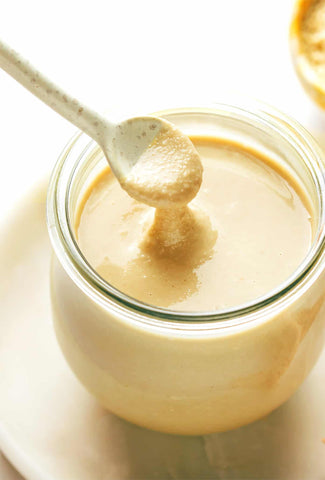Should you refrigerate tahini?
While refrigerating tahini won't cause any harm, it can slow down the natural process of oil separation. Tahini can be stored either in a cool, dark pantry or in the fridge. However, we prefer the pantry, as refrigeration can alter the consistency, potentially making your tahini less silky smooth. If you've blended your tahini with other ingredients to create a sauce, it's advisable to store it in the fridge and consume it within 5 days for optimal freshness.

Let's explore the factors influencing the decision to refrigerate tahini.
Factors to Consider:
- Storage Instructions: Check the label on your tahini jar. Some brands recommend refrigeration after opening, while others suggest storing it in a cool, dry place. Manufacturers often provide specific storage instructions to maintain the product's quality and prevent spoilage.
- Natural Separation: Tahini can naturally separate into solids and oil over time. Refrigeration can slow down this process, making it easier to remix before use. If you prefer a smoother consistency, storing tahini in the fridge may be beneficial.
- Temperature Stability: Sesame oil can go rancid if exposed to warm temperatures for an extended period. If your kitchen tends to get warm, refrigerating tahini can help prolong its shelf life and preserve its flavor.
- Texture Preferences: Some individuals prefer the thicker, more solid texture of chilled tahini, while others like the smoother consistency at room temperature. Consider your personal preference and how you typically use tahini in your recipes.
Pros and Cons:
Pros of Refrigerating Tahini:
- Prolong shelf life by preventing the oil from going rancid.
- Slows down natural separation, making it easier to mix.
- Preserves freshness and flavor, especially in warmer climates.
Cons of Refrigerating Tahini:
- Cold temperatures can cause tahini to thicken, making it less pourable.
- Some find the texture less appealing when chilled.
- Takes longer to reach room temperature when needed for recipes.

